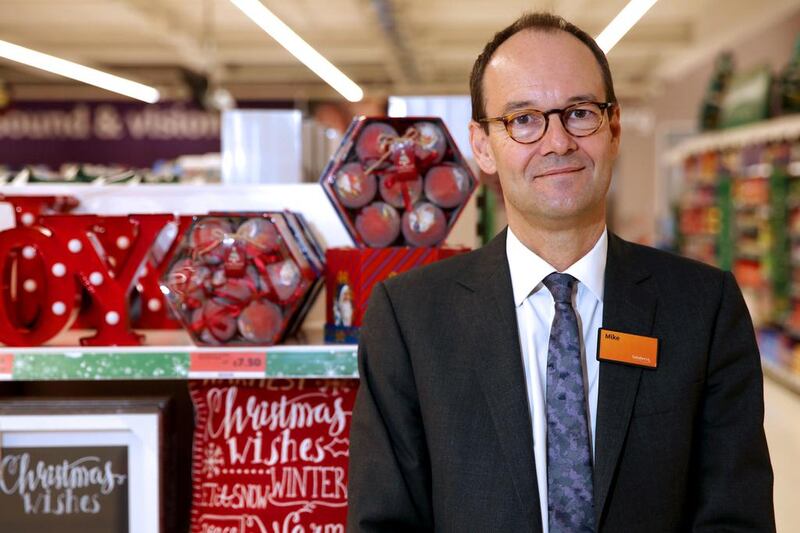It is barely two weeks into 2016 and the UK deal bandwagon is well and truly rolling.
The biggest deal announced so far may have been Shire’s £22 billion (Dh115.18bn) agreed takeover of the US rare disease specialist Baxalta, but the one that is exciting the most comment is a possible transaction between the United Kingdom’s second-biggest supermarket and a catalogue retailer, best known for selling children’s toys and cheap consumer electricals.
Five days into the new year, Sainsbury’s stunned the market by announcing that last November it had made an approach to Home Retail Group, the owner of the catalogue retailer Argos and the do-it-yourself store Homebase.
That approach was rejected, but Sainsbury’s, which is 25 per cent owned by the Qatar Investment Authority, is not deterred. It has until February 2 to make an offer or walk away.
An offer for Home Retail Group, essentially Argos, now looks almost certain, following the announcement that it is in advanced talks to sell its Homebase stores for £340 million to a West Australian company, Wesfarmers. That sale smooths the way for a successful bid from Sainsbury’s for Argos alone.
Between discussing mince pies and Christmas pudding sales this week, Mike Coupe, the chief executive of Sainsbury’s, laid out his ambitions to create a £6bn retail giant to rival the United States’ Amazon and the British favourite John Lewis.
Behind the move is the recognition that people are changing the way they shop. Mr Coupe described the difference between his mother’s shopping behaviour – a social daily experience involving small purchases and chatting to shopkeepers – and his daughter’s, which is conducted entirely on a mobile phone.
“Customers’ expectations are changing. They want a huge variety of products and they want them quickly,” he says.
They want to shop online from their own home and on the go. Sometimes they want home delivery, other times they favour click and collect, for everything from groceries to granny’s birthday present.
The grocer thinks putting together Sainsbury’s and Argos can drive growth in this new digital economy. Mr Coupe says: “20 per cent of our business now comes through convenience or online. Ten per cent of our turnover is in non-food, a category that did not exist 10 years ago. We want to accelerate this.” Sainsbury’s has actually been talking to Argos for 18 months now, since it launched a partnership with the non-food retailer under which Argos opened concessions in 10 of its stores. Mr Coupe said he admires its business and believes the two companies’ cultures are compatible.
However, there are fears that combining the companies would be devastating for the British high street and lead to the loss of thousands of jobs.
Sainsbury’s has indicated that up to 200 Argos stores out of 734 could close, although concessions would be opened in Sainsbury’s premises.
Analysis by a retail property agent has suggested that 245 Argos stores are less than half a mile from a Sainsbury’s store. Yet Sainsbury’s rejects suggestions that a merger would be another nail in the coffin of the struggling high street.
Property synergies and lower rental outgoings do feature in Sainsbury’s plan, although Mr Coupe was keen to suggest that putting Argos and Sainsbury’s together could actually create more jobs across the country. “If we are successful, we will be seeking to create jobs,” he said.
Meanwhile, there is a large pool of Sainsbury’s customers (about 60 per cent) who are not shopping in Argos to win over and an equally large group of Argos customers who do not shop at the supermarket. Extending Argos into Sainsbury’s stores could lead to 2,000 places on the high street where people could shop with both brands, he said.
Mr Coupe’s January 5 sales pitch was smoothly made but not uniformly welcomed. Shares in Sainsbury’s fell by 5.1 per cent that day, though they have since stabilised.
Still, some of the company’s biggest investors remain unconvinced. Richard Marwood, a fund manager at Axa, which holds shares in both companies, said: “I still think there are a lot unanswered questions.” Another shareholder described the presentation as “22 pages of nothing”.
The investor that holds the most sway is yet to reveal its hand. Asked directly whether the Qatar Investment Authority backed the deal, Mr Coupe said it was inappropriate for him to comment, adding that shareholders had not yet seen the financial details of any bid and so were not in a position to make a decision.
“But we think that we can present a compelling financial case,” he said. One potential stumbling block is that the QIA does not want its stake in the retailer to be diluted, but nor does it want to invest more in the company. If Sainsbury’s pays in cash and shares, as has been suggested, the deal would dilute QIA’s holding unless it paid for more shares.
It appears that Sainsbury’s ambition is at odds with QIA’s strategy to diversify its investment portfolio away from Europe.
While Mr Coupe was full of his grand vision for the combined retail group, it was left to John Rogers, Sainsbury’s finance director, to keep feet firmly on the ground.
“We think this is a strategically compelling opportunity and, if it is at the right price, financially compelling,” he said. However, he made it clear that the supermarket group would not do a deal “at any price”.
The price might have come down a notch with news on Thursday that Home Retail’s sales over the Christmas holiday period were down 2.2 per cent from a year earlier – whereas analysts had been expecting a gain of 0.6 per cent.
business@thenational.ae
Follow The National's Business section on Twitter





